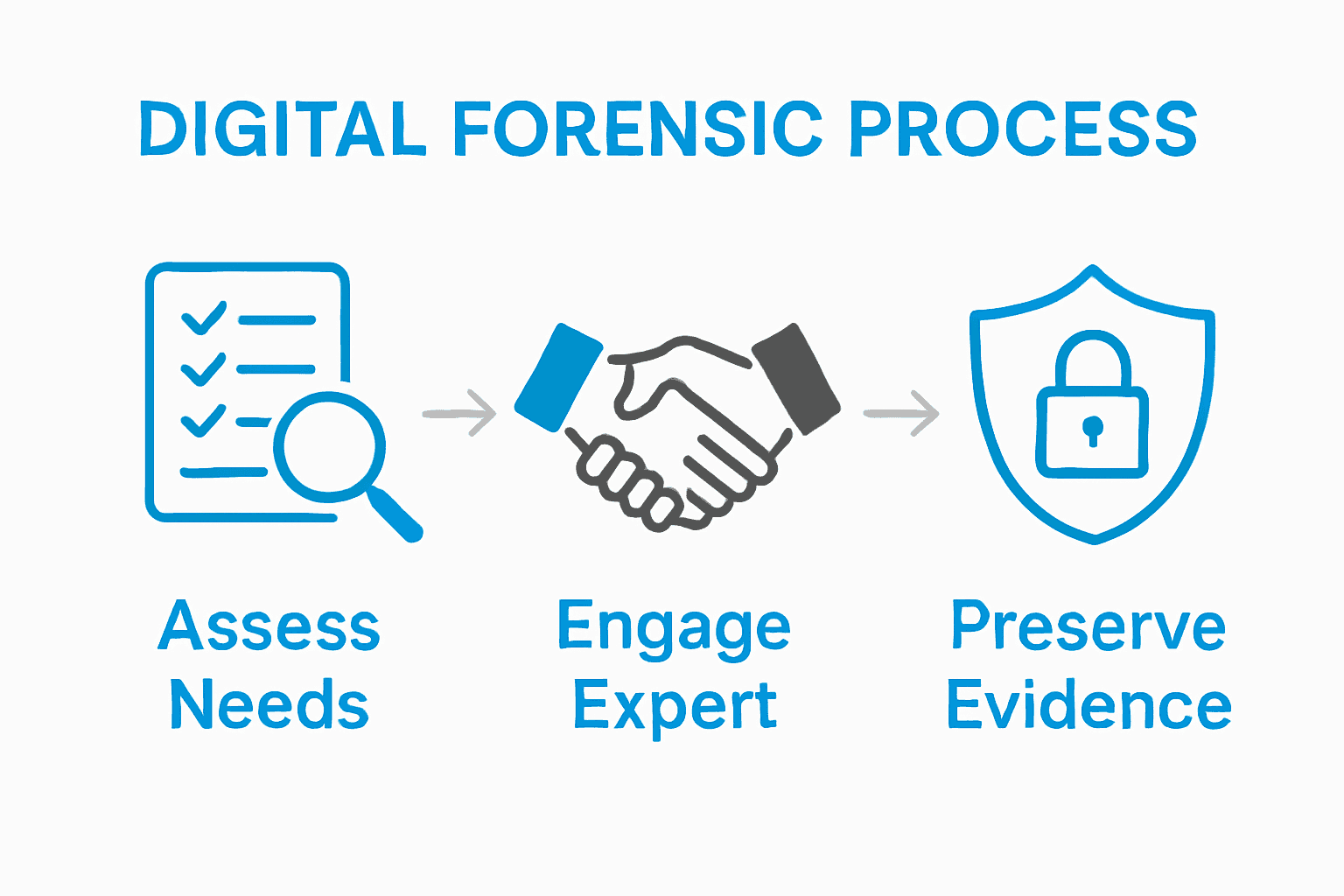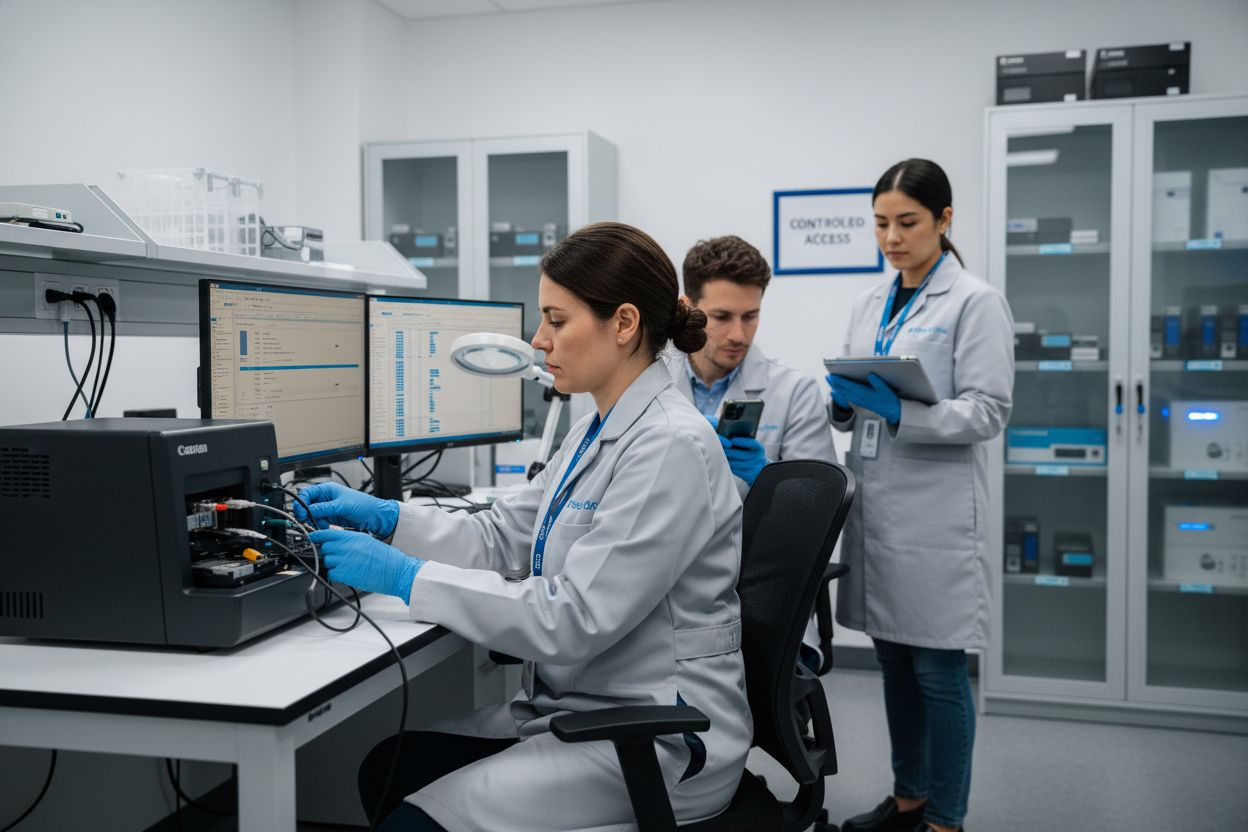Did you know that over 90 percent of legal cases now involve some form of digital evidence? When faced with legal disputes or cybersecurity threats, missing key digital trails can weaken your case. Fast action and the right expertise make all the difference. This step-by-step guide shows you how to assess your needs, connect with forensic experts, collect and protect evidence, and turn complex data into valuable insight for legal success.
Quick Summary
| Key Point | Explanation |
|---|---|
| 1. Assess investigation needs early | Identify specific incidents and allegations for effective evidence collection. |
| 2. Engage a forensic expert promptly | Consulting a digital forensics professional ensures strategic guidance and preservation of evidence. |
| 3. Preserve evidence meticulously | Follow strict protocols to maintain evidence integrity and chain of custody during collection. |
| 4. Utilize advanced forensic analysis tools | Employ specialized software to uncover hidden data and reconstruct digital timelines efficiently. |
| 5. Review findings for actionable insights | Understand expert analysis to inform legal strategies and next investigative steps effectively. |
 |
|
Table of Contents
- Step 1: Assess Your Digital Investigation Needs
- Step 2: Engage An IT Forensic Expert For Consultation
- Step 3: Collaborate To Collect And Preserve Evidence
- Step 4: Implement Advanced Forensic Analysis Methods
- Step 5: Review And Validate Investigation Findings
Step 1: Assess Your Digital Investigation Needs
When legal challenges emerge, understanding your digital investigation requirements becomes crucial. This step helps you systematically identify what digital evidence you need and how a forensic expert can support your specific situation.
Starting your digital investigation requires a clear assessment of the potential issues at hand. According to research from independent digital forensics experts, organisations facing allegations need to quickly preserve evidence, validate facts, and develop a strategic legal approach.
Begin by asking yourself key diagnostic questions: What specific incident or allegation are you investigating? Are you dealing with potential employee misconduct, intellectual property theft, cybercrime, or data breach? Each scenario demands a different forensic approach and evidence collection strategy.
Your next move involves identifying the digital sources potentially holding relevant evidence. This could include:
- Company computers and laptops
- Mobile devices and smartphones
- Cloud storage accounts
- Email servers
- Social media platforms
- Network logs and server records
Here’s a summary of typical digital evidence sources and their potential relevance:
| Digital Source | Common Evidence Types | Typical Relevance |
|---|---|---|
| Company computers | Emails Documents Logs |
Employee conduct IP theft Fraud |
| Mobile devices | Text messages App data Calls |
Insider threats Data leakage |
| Cloud storage | Shared files Account activity |
IP theft Unauthorised access |
| Email servers | Messages Attachments |
Harassment Fraud Phishing |
| Social media | Posts Messages Images |
Reputation issues Data breaches |
| Network/server logs | Access records Error logs |
Breach analysis Intrusion detection |
Pro Tip: Always consult legal counsel before initiating any digital investigation to ensure you maintain proper chain of evidence and comply with data protection regulations.
Research from general counsel experts emphasises the importance of involving forensic professionals early. They recommend identifying and securing electronically stored information before it can be lost or accidentally overwritten.
Once you have a clear picture of your investigation’s scope, you will be ready to engage a professional digital forensics team who can help transform your digital evidence into actionable insights for your legal strategy.
Step 2: Engage an IT Forensic Expert for Consultation
With your investigation needs clearly mapped out, the next critical step is connecting with a skilled digital forensics professional who can transform your digital challenge into a solvable case. Computer forensics experts offer specialised support to navigate complex digital investigations with precision.
The consultation process is your strategic entry point into understanding the depth and potential of your digital investigation. According to research from external counsel experts, engaging an external digital forensics consultant helps protect confidentiality and ensures early involvement to preserve critical electronically stored information.
When reaching out to a forensic expert, prepare to share specific details about your case. Be ready to discuss:
- The nature of the potential digital incident
- Specific devices or systems involved
- Timeline of events
- Any immediate concerns or urgent requirements
- Potential legal implications
During the initial consultation, expect a comprehensive case review. As detailed by forensic consultation professionals, the expert will:
- Review your case background
- Identify potential data sources
- Assess necessary forensic work
- Align expectations and legal considerations
- Scope the investigation method
Pro Tip: Choose a forensics expert who offers clear communication, demonstrates technical expertise, and understands the legal nuances of digital investigations.
The consultation is your opportunity to establish trust, understand the potential investigative approach, and determine whether the forensic expert can meet your specific needs. Their initial assessment will provide insights into the complexity of your case and the potential strategies for uncovering digital evidence.
Once you have selected the right forensic expert and agreed on initial terms, you will move forward to the next phase of your digital investigation with confidence and professional support.
Step 3: Collaborate to Collect and Preserve Evidence
After establishing the initial consultation, you now enter the critical phase of evidence collection and preservation. Preserving digital evidence is not just a technical process but a meticulous strategy that can make or break your entire investigation.
According to research from digital forensic experts, successful evidence collection requires careful planning. This involves defining clear investigation scope, aligning all stakeholders, and anticipating potential challenges before beginning the forensic process.
Your forensic expert will work closely with you to identify and secure all relevant digital sources. This typically includes:
- Company computers and servers
- Mobile devices and tablets
- Cloud storage accounts
- Email systems
- Network logs and access records
- External storage devices
The collection process follows strict protocols to maintain evidence integrity. As detailed by industry professionals, evidence acquisition uses specialized forensic tools that create exact digital copies or images of devices. These tools ensure the original data remains completely untouched and maintains its admissibility in legal proceedings.
Pro Tip: Never attempt to investigate digital evidence independently. Improper handling can permanently alter or destroy critical information.
Maintaining a documented chain of custody is paramount. This means tracking every interaction with the digital evidence, recording who accessed it, when, and under what circumstances. This documentation provides credibility and ensures the evidence can withstand potential legal scrutiny.

Your active collaboration during this stage is crucial. Be prepared to provide context, grant necessary access permissions, and support the forensic team in identifying all potential sources of digital information related to your investigation.
Once evidence is collected and preserved, you will be ready to move into the detailed analysis phase where digital forensic experts will meticulously examine the gathered information to uncover critical insights.
Step 4: Implement Advanced Forensic Analysis Methods
With your digital evidence carefully collected and preserved, forensic experts now begin the complex process of sophisticated data analysis. Forensic data analysis transforms raw digital information into meaningful investigative insights that can uncover critical evidence.
According to research from digital forensics professionals, analysts use specialized software to navigate through extensive data volumes. Their goal is uncovering deleted, encrypted, or hidden files that might hold crucial information relevant to your investigation.
Advanced forensic analysis encompasses multiple sophisticated techniques:
- Computer system forensics
- Mobile device investigations
- Cloud data examination
- Network activity tracking
- Malware and security breach analysis
Research from forensic investigation experts highlights the use of cutting-edge tools like EnCase, Cellebrite, Magnet AXIOM, and Nuix. These powerful platforms enable forensic professionals to:
- Recover permanently deleted data
- Reconstruct precise digital timelines
- Analyze complex malware signatures
- Examine cross platform digital activities
Pro Tip: Always ensure your forensic team maintains strict chain of custody protocols to guarantee evidence admissibility in legal proceedings.
The analysis phase involves methodical examination where experts meticulously piece together digital fragments. They look for patterns, anomalies, and connections that might reveal the full story behind your digital investigation.
Expect your forensic team to provide comprehensive reporting that translates technical findings into clear, understandable insights. Their goal is not just collecting data but presenting meaningful evidence that can support your legal or investigative objectives.
As the detailed analysis concludes, you will be prepared to review the findings and determine the next strategic steps in your investigation.
Step 5: Review and Validate Investigation Findings
After intensive digital forensic analysis, you arrive at a critical juncture where expert findings are transformed into actionable intelligence. Digital forensic experts will guide you through interpreting complex technical evidence with precision and clarity.
According to research from independent forensic consultants, the findings provide a defensible and reliable foundation that can support critical legal actions such as obtaining injunctions or search warrants.
The review process involves several key components:
- Comprehensive report examination
- Technical evidence verification
- Cross referencing digital artifacts
- Assessing potential legal implications
- Identifying actionable insights
Research from forensic consulting professionals highlights that expert reports offer an objective perspective crucial for legal teams. These reports help interpret complex technical findings and can significantly influence litigation strategies.
Pro Tip: Always request a detailed explanation of methodologies used in the forensic investigation to understand the reliability of the findings.
During the review, your forensic expert will walk you through each piece of evidence, explaining its significance and potential legal ramifications. They will help you understand how digital artifacts connect and what story they tell about the investigated incident.
Expect a comprehensive debrief that translates technical jargon into clear, understandable language. The goal is not just presenting data but providing a coherent narrative that supports your legal or investigative objectives.
As you conclude the review and validation stage, you will be prepared to make informed decisions about potential next steps, whether that involves legal action, internal resolution, or further investigation.
Transform Your Digital Investigation with Proven Forensic Expertise
Facing uncertainty about digital evidence collection or worried about handling sensitive information correctly? This guide has shown how crucial it is to engage a professional who can preserve your data, provide clear analysis, and help you make informed decisions during complex investigations. Whether you are tackling employee misconduct, data breaches, or cybercrime, it is natural to feel overwhelmed by the technical and legal steps required to protect your interests.
Ready to secure expert support that stands up in court and supports your legal or business goals? Explore our Expert Witness services for reliable, independent testimony. If you are specifically concerned about digital breaches or suspicious cyber activity, our Computer Hacking Examination services offer in-depth investigation and precise reporting. Take control of your case today with Computer Forensics Lab, London’s trusted digital forensic partner. Book a confidential consultation now to get tailored guidance and protect your organisation’s future.
Frequently Asked Questions
How can an IT forensic expert help with a digital investigation?
An IT forensic expert can assist by assessing your investigation needs, collecting digital evidence, and analyzing it for actionable insights. Start by identifying the specific incident you need help with to ensure tailored support in your case.
What steps should I take before consulting an IT forensic expert?
Before consulting an IT forensic expert, clearly define the nature of your digital incident, document relevant devices involved, and establish a timeline of events. Prepare this information to facilitate a productive consultation and ensure no vital details are overlooked.
How do I work with an IT forensic expert during evidence collection?
Collaborate with your IT forensic expert by granting access to all relevant devices and systems, and provide context for the data being collected. This cooperation is essential to preserve evidence integrity and create a documented chain of custody during the investigation.
What should I expect from the analysis phase of a forensic investigation?
During the analysis phase, expect the expert to use advanced techniques to uncover important patterns and insights from your digital evidence. Ensure you are prepared to review their findings thoroughly to understand how these insights may influence your legal or business decisions.
How can I validate the findings presented by the forensic expert?
To validate the findings, carefully review the expert’s comprehensive report and ask for clarifications on the methodologies used during the investigation. This understanding will help you assess the reliability of the findings and their implications for your case.
What actions should I take following the forensic investigation?
After the investigation, use the insights and reports provided by your forensic expert to inform your legal strategy or internal resolutions. Decide your next steps based on the evidence uncovered, whether it involves proceeding with legal action or implementing internal changes.
